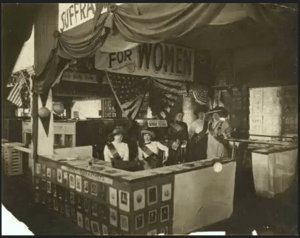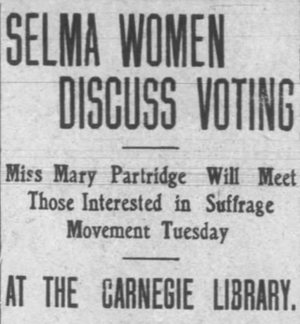Timeline of women's suffrage in Alabama facts for kids
The fight for women's right to vote in Alabama has a long history. This is a timeline showing how women in Alabama worked to gain the right to vote, also known as women's suffrage. Their efforts began in the late 1860s and grew stronger in the 1890s. After 1901, much of this work slowed down, but it started up again in 1910.
Alabama did not officially approve the Nineteenth Amendment (which gave women the right to vote across the U.S.) until 1953. Even after that, many African-American women and other women faced challenges like poll taxes until the mid-1960s.
Contents
- Early Efforts for Women's Vote in Alabama
- 20th Century: The Fight Continues
- The 1900s: Early Conventions and Speeches
- The 1910s: Organized Efforts and Milestones
- 1910: Selma's Suffrage League
- 1911: Birmingham's Equal Suffrage League
- 1912: A State Association Forms
- 1913: Major Steps for AESA
- 1914: Expanding Reach and Public Awareness
- 1915: Legislative Push and Publications
- 1916: Opposition and Conventions
- 1917: Growing Clubs and Education
- 1918: Selma Hosts AESA Convention
- 1919: Alabama Rejects the 19th Amendment
- The 1950s: Alabama Approves the 19th Amendment
- The 1960s: Voting Rights for All
Early Efforts for Women's Vote in Alabama
The 1860s: Seeds of Suffrage
1867: A Voice for Women's Rights
- In 1867, Pierce Burton wrote an article. It supported the idea of women having the right to vote in Alabama.
1868: Alabama's First Representative
- Priscilla Holmes Drake was the only person from Alabama. She represented the state at the National Woman Suffrage Association (NWSA) meeting.
The 1890s: Growing Support for Suffrage
1892: New Suffrage Groups Form
- In 1892, groups supporting women's right to vote started. They formed in cities like New Decatur and Verbena.
1893: The Alabama Woman Suffrage Organization
- The Alabama Woman Suffrage Organization was officially created in 1893. This was an important step for the movement.
1894: Huntsville Joins the Cause
- The Huntsville League for Woman Suffrage was formed in 1894. More cities were getting involved.
1895: Famous Leaders Visit Alabama
- In 1895, two very famous leaders visited Alabama. Susan B. Anthony and Carrie Chapman Catt both spoke about women's suffrage.
20th Century: The Fight Continues
The 1900s: Early Conventions and Speeches
1900: State Suffrage Convention
- October 1: A state convention for women's suffrage was held in Huntsville. People gathered to discuss their goals.
1901: Speaking Up for Suffrage
- Emera Frances Griffin spoke out in favor of women's suffrage. She did this at the state constitutional convention in 1901.
The 1910s: Organized Efforts and Milestones
1910: Selma's Suffrage League
- March 29: The Selma Suffrage League was formed. This showed new energy for the movement.
1911: Birmingham's Equal Suffrage League
- October 22: The Equal Suffrage League of Birmingham was created. This group helped organize efforts in a major city.
1912: A State Association Forms
- October 9: The Alabama Equal Suffrage Association (AESA) was officially formed in Birmingham. This group would lead many suffrage efforts.
- AESA set up its main office in Birmingham.
- The Huntsville Equal Suffrage Association was also created this year.
1913: Major Steps for AESA
- AESA held its first state convention in Selma. It took place at the Hotel Albert. Pattie Ruffner Jacobs was chosen as the group's president.
- March 3: Delegates from Alabama marched in the Woman Suffrage Procession in Washington D.C. This was a big national event.
- June: AESA sent representatives to an international meeting. It was the International Suffrage Alliance in Budapest.
- July: A suffrage association was formed in Tuscaloosa, Alabama.
- December: Representatives from AESA attended the forty-fourth annual NAWSA convention. Pattie Ruffner Jacobs spoke at this important national meeting.
1914: Expanding Reach and Public Awareness
- February 5: AESA held its state convention in Huntsville. Many towns sent representatives, including Birmingham, Cullman, Mobile, and Selma.
- September: Suffragists set up a special booth at the Alabama State Fair. This helped them share their message with more people.
1915: Legislative Push and Publications
- AESA held its state convention in Tuscaloosa.
- AESA's main office moved to Selma.
- August 25: A bill to give women the right to vote was presented to the state legislature. However, it did not get enough votes to pass.
- October: AESA started publishing its own newspaper, the Alabama Suffrage Bulletin.
1916: Opposition and Conventions
- The Alabama Association Opposed to Woman Suffrage (AAOWS) was formed. This group worked against women getting the vote.
- February 9: AESA held its state convention in Gadsden.
1917: Growing Clubs and Education
- February 12–13: AESA held its state convention in Birmingham. About 81 suffrage clubs reported their activities. A special suffrage school was held afterward, teaching about 200 students.
1918: Selma Hosts AESA Convention
- May 7–8: AESA held its state convention in Selma.
1919: Alabama Rejects the 19th Amendment
- The Alabama Woman's Anti-Ratification League (AWARL) was formed. This group worked to stop Alabama from approving the 19th Amendment.
- September 22: Alabama officially rejected the Nineteenth Amendment.
The 1950s: Alabama Approves the 19th Amendment
1953: A Long-Awaited Ratification
- September 8: Alabama finally approved the Nineteenth Amendment. This happened many years after it became law for the rest of the U.S.
The 1960s: Voting Rights for All
1964: End of Poll Taxes
- January 23: Poll taxes were ended across the country. This happened because of the Twenty-Fourth Amendment. Poll taxes had made it harder for many people, especially African Americans, to vote.
1965: The Voting Rights Act
- The Voting Rights Act of 1965 was passed. This important law helped make sure that African-American women and all citizens had full access to their right to vote.
Black History Month on Kiddle
African-American Astronauts:
 | Victor J. Glover |
 | Yvonne Cagle |
 | Jeanette Epps |
 | Bernard A. Harris Jr. |

All content from Kiddle encyclopedia articles (including the article images and facts) can be freely used under Attribution-ShareAlike license, unless stated otherwise. Cite this article:
Timeline of women's suffrage in Alabama Facts for Kids. Kiddle Encyclopedia.


